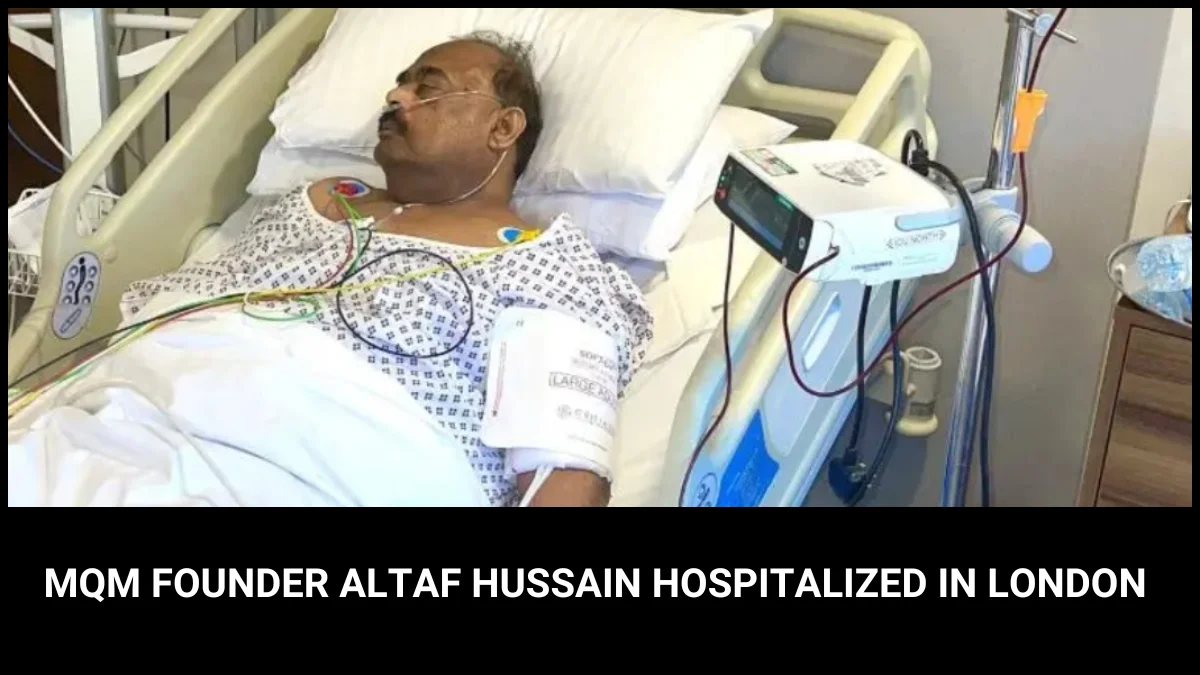Muttahida Qaumi Movement (MQM) founder Altaf Hussain is currently in a London hospital battling a serious illness, according to party officials. The 71-year-old political leader, who has been living in self-exile in the UK since 1992, was admitted on July 10, 2025, after his health took a turn for the worse. This news has sparked concern among his supporters, with many taking to social media to pray for his recovery.
Altaf Hussain’s Health Crisis: What We Know
Altaf Hussain was rushed to a North London hospital after experiencing severe health issues. According to Mustafa Azizabadi, a senior MQM leader based in London, doctors conducted a series of diagnostic tests, including blood tests, ECG, CT scans, X-rays, and ultrasounds, to assess his condition. A blood transfusion was also administered to address his deteriorating health.
Qasim Ali Raza, Deputy Convener of MQM’s Central Coordination Committee, revealed that Hussain has been under immense stress due to ongoing legal battles, financial struggles, and the complex political situation in Pakistan and abroad. “Mr. Altaf Hussain has been suffering from severe emotional and mental stress for a long time,” Raza said in a statement on X. Doctors are closely monitoring his condition, and supporters are hopeful for his recovery.
Hussain’s health has been a concern in the past. In February 2021, he was admitted to the intensive care unit (ICU) after contracting Covid-19 twice in the same year. Fortunately, he recovered both times. Sources close to Hussain also noted that he is diabetic, and a recent foot injury that failed to heal properly may have contributed to his current health issues, along with heart-related stress.
Who is Altaf Hussain? A Look at His Life and Legacy
Born on September 17, 1953, in Karachi, Pakistan, Altaf Hussain grew up in the middle-class neighborhood of Azizabad. He graduated with a degree in Pharmacy from the University of Karachi in 1979. His political career began in 1978 when he co-founded the All-Pakistan Mohajir Students Organisation (APMSO), which gained significant popularity among Urdu-speaking communities. This laid the foundation for the Muttahida Qaumi Movement (MQM), established in 1984 to represent Urdu-speaking migrants who moved to Pakistan during the 1947 partition.
Under Hussain’s leadership, MQM became a major political force, dominating urban Sindh in the 1988 elections and emerging as Pakistan’s third-largest political party at the time. However, his leadership was not without controversy. The MQM faced allegations of using violent tactics to maintain power, while Hussain claimed the state and rival parties targeted his party unfairly.
Why Did Altaf Hussain Go Into Exile?
In the early 1990s, a government operation in Karachi forced Hussain to flee to London, where he has lived in self-imposed exile for over three decades. He later obtained British citizenship but continued to influence Pakistani politics through speeches broadcast to his supporters in Karachi. His outspoken nature often landed him in trouble. In May 2013, he sparked controversy by allegedly calling for Karachi’s separation from Pakistan, a statement his party later said was misunderstood.
The most significant blow came in August 2016 when Hussain delivered a fiery speech, labeling Pakistan as “a cancer for the entire world.” This led to a crackdown by Pakistani authorities, who sealed MQM’s Karachi headquarters and Hussain’s Azizabad residence. His own party leaders in Pakistan distanced themselves from him, removing his name from the party constitution.
Legal Battles and Financial Struggles
Hussain’s time in London has been marked by legal and financial challenges. In October 2019, British police charged him with “encouraging terrorism” over his 2016 speech. He was arrested but released on bail. In February 2022, a 12-member jury acquitted him of two counts of encouraging terrorism under the UK’s Terrorism Act 2006. Despite the legal victory, the stress of multiple lawsuits and financial difficulties has taken a toll on his health, according to MQM officials.
In 2023, Hussain faced another setback when he lost a £10 million property case to MQM-Pakistan in a UK High Court ruling, further adding to his financial woes.
Current Health Status and Public Reaction
As of July 12, 2025, Altaf Hussain remains under close medical supervision in London. While his condition is described as serious, MQM leaders remain optimistic. Mustafa Azizabadi stated, “Hopefully, it’s not something serious,” urging supporters to pray for Hussain’s recovery. Social media platforms, particularly X, are filled with messages of support using hashtags like #GetWellSoonAltafBhai.
Summarizes key details about Altaf Hussain’s hospitalization:
| Aspect | Details |
| Date of Hospitalization | July 10, 2025 |
| Location | North London Hospital |
| Medical Tests | Blood tests, ECG, CT scan, X-ray, ultrasound |
| Treatment | Blood transfusion, medications |
| Health Issues | Severe emotional stress, diabetes, heart stress, unhealed foot injury |
| Previous Health Scare | Covid-19 (ICU admission in February 2021) |
| Current Status | Under close medical observation |
Prayers for Altaf Bhai's speedy recovery.@AltafHussain_90 pic.twitter.com/ca4x0bMEtf
— Ahmad Farhad (@AhmadFarhadReal) July 11, 2025
Update 🚨
— Murtaza Ali Shah (@MurtazaViews) July 11, 2025
MQM leader Altaf Hussain is fine, better than yesterday and recovering. News circulating about him on social media is fake. pic.twitter.com/8UmSavIAsE
Altaf Hussain’s Political Influence Today
Despite being in exile, Altaf Hussain remains a significant figure for many MQM supporters. His speeches continue to resonate with the Urdu-speaking community in Pakistan, particularly in Karachi. However, his influence has waned in recent years due to internal party divisions and legal challenges. The MQM in Pakistan has largely moved away from Hussain’s leadership, but his loyalists in London and among the diaspora continue to view him as a key figure.
Altaf Hussain’s hospitalization is not just a health concern but also a moment of reflection for his supporters and critics alike. His journey from a student leader to a polarizing political figure highlights the complexities of Pakistani politics. As news of his illness spreads, it reignites discussions about his legacy, the MQM’s future, and the challenges faced by Urdu-speaking communities in Pakistan.
For now, the focus remains on Hussain’s recovery. His supporters are rallying behind him, hoping for positive updates from his medical team in London.



Join The Discussion